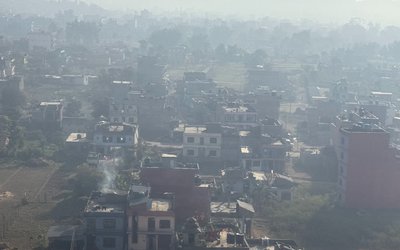
The Communists are taking over in Nepal, and nobody cares. Thirty years ago it would have caused a grave international crisis; fifty years ago there would even have been talk of foreign military intervention. Today – nothing. Outside Nepal, it has barely made the news at all.
In the grand old Marxist tradition, Nepal’s Communists have split and split again over fine points of doctrine and strategy. Recently, however, the Communist Party of Nepal – Unified Marxist-Leninist (CPN-UML) and the Communist Party of Nepal (Maoist Centre) managed to form an electoral alliance that swept the recent national elections, the first since 1999.
Various Communist leaders have held office in the revolving-door coalitions, none lasting much more than a year, that have governed Nepal since it began its democratic transition a dozen years ago, but you couldn’t truthfully have said that ‘the Communists are in power.’
Now you really can say it. The CPN-UML and the CPN (Maoist Centre) ran a single joint candidate in every constituency in Nepal, and won two-thirds of the seats (174 out of 275). The two parties are pledged to unite within six months, and they will form a government without non-Communist members that will rule Nepal, if all goes well, for the next five years.
They are real Communists, too, unlike the namby-pamby ‘Eurocommunists’ who sought popular support in Western Europe by disavowing violent revolution in the final decade before the collapse of Communist power in Eastern Europe in 1989-91. Nepal’s Communists fought a ten-year ‘revolutionary’ guerilla war that killed 17,000 people before a ceasefire was signed in 2006 and the democratic transition began.
Nepal is not some tiny, irrelevant backwater. It is a country with more people than Australia, and it takes up half of the Himalayan border between China and India. In the self-serving definition of the world’s think-tanks and ‘strategic studies institutes’, it is important strategic territory. Yet Washington doesn’t really care that the Communists are taking over, and neither does Moscow.
New Delhi and Beijing care a little bit, because of their inevitable rivalry as Asia’s and the world’s two biggest countries (1.3 billion people each). Both see their relations with Nepal as a zero-sum game, and India’s traditionally dominant influence there (all Nepalis live on the Indian side of the Himalayas) is threatened by the presumed preference of Nepalese Communists for fellow Communists in China.
But the lights are not burning late either in South Block or in Chaoyang. The fact of the matter is that Communists coming to power in Nepal in 2018 makes no more difference to the rest of the world than Communists coming to power in South Vietnam did in 1975.
Well, you knew where I was going with this, didn’t you? South Vietnam had about the same number of people in 1975 as Nepal does now, and it was just as ‘strategic’ – which is to say, not very strategic at all.
When the Communists won in the South and reunified Vietnam, it may even have changed the lives of most South Vietnamese for the better, although that depends on what you mean by ‘better’. It certainly didn’t change anybody’s domestic policies elsewhere in Southeast Asia, or change the calculations of the major powers in any way.
The whole Vietnam War, which killed 55,000 American soldiers and about three million Vietnamese, was founded on the delusion that there was a monolithic Communist bloc that threatened ‘freedom’ all over the world. Certainly there were Communist fanatics who dreamed of spreading their ideology all over the world, but the reality was geopolitics as usual. The Soviet Union and Communist China fought a border war in 1969 to demonstrate that fact, and for slow learners Communist China and Communist Vietnam fought their own border war in 1979 to drive the lesson home.
Now, mercifully, the ‘domino theory’ is dead (or at least dormant), and the arrival of Communists in power in Nepal through entirely legal and democratic means is causing no panic whatever. Whether their new government will serve the Nepalese well remains to be seen, but Nepal’s Communists are publicly committed to respecting the rules of parliamentary democracy, and a majority of Nepalese clearly believe them.
Courtesy: Red Deer Advocate















